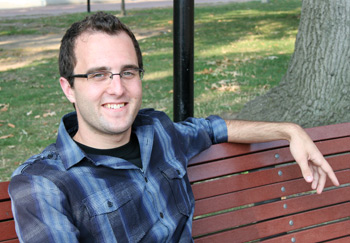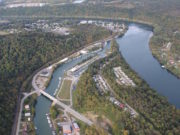 Karl Borton grew up in Forty Fort in the shadow of the Cross Valley Expressway, in a house just two blocks and a short stroll from the edge of the Susquehanna River in Luzerne County. He was intimately aware of the river, but it was only through the interpretation of previous generations: The river rises, floods and destroys.
Karl Borton grew up in Forty Fort in the shadow of the Cross Valley Expressway, in a house just two blocks and a short stroll from the edge of the Susquehanna River in Luzerne County. He was intimately aware of the river, but it was only through the interpretation of previous generations: The river rises, floods and destroys.
The levee walls that met Borton whenever he glanced toward the river prevented him from getting too close to the water as a child. Many grew up just like Borton, fearing the River that had devastated the region in 1972 and threatened it countless times since.
Now, Borton is responsible for bringing hundreds of thousands of people from the Wyoming Valley and beyond to the banks of the Susquehanna, and it turns out the old river is as inviting as it used to be menacing. Borton volunteered as the events coordinator last summer for the $23 million River Common riverfront recreation area in Wilkes-Barre. He was so instrumental in helping the River Common build buzz and attract visitors that he was made a full-time, paid employee of the city’s revitalization arm, the non-profit Diamond City Partnership. He is transforming the property, which stretches along the Wilkes-Barre side of the Susquehanna near the Market Street Bridge from the Luzerne County Courthouse south to Wilkes University, into something that rivals any of the nation’s most revered and successful riverfront parks, like those in Sunbury, Pittsburgh, Hartford (CT) and Chattanooga (TN).
 Using a mix of free recreation, education, entertainment, environmental and family-friendly activities, Borton has established hope where there was once fear and made Wilkes-Barre’s downtown bigger and better. With a half marathon slated for this weekend an open mic/local, original music series starting next week at the amphitheater, Borton talked to Keystone Edge about what has worked and what to expect in the future.
Using a mix of free recreation, education, entertainment, environmental and family-friendly activities, Borton has established hope where there was once fear and made Wilkes-Barre’s downtown bigger and better. With a half marathon slated for this weekend an open mic/local, original music series starting next week at the amphitheater, Borton talked to Keystone Edge about what has worked and what to expect in the future.
Keystone Edge (KE): What’s your favorite part of River Common?
Karl Borton (KB): I really enjoy Millenium Circle, which is one of the portal entrances from Wilkes-Barre to the park itself. It’s a gateway between landside and riverside and it’s a beautiful section with laid brick and granite, a fountain system and benches, and ornamental trees and gardens. It’s a perfect place to sit and look down over the park and see what’s happening. In the little time I’ve been working here, we’ve had two weddings at this location. It’s quite a sight, to see our local brides and grooms down there, in a fusion of urban and natural settings, and it’s the greatest way to enter and enjoy the park.
KE: What would you consider a highlight of the park’s brief existence?
KB: Our 11th annual Riverfest celebration, which engulfed the River Common the third week of June. It was basically three days of educational workshops and activities geared toward the river and included more than 20 local artists performing on two stages. The activities were free to the public. We had local artists like George Wesley, Stingray and Mike Miz, and attracted more than 3,000 people to the park. In addition, we had 400 kayakers participate in our river sojourn, which is a 10-mile trek from Harding to Wilkes-Barre each day of the festival.
Besides that we had the Luzerne Foundation annual meeting in early May, with Wesley and Cabinet, which brought more than 1,000 people and kicked off our season. Since then we’ve been putting together weekly events to include kids activities and animal programs, yoga and dance series, and an open mic/concert series. In a sense, we’ve been trying to put together a diverse schedule as diverse as Wilkes-Barre’s population. It’s a great way to interact with the river. You can fish off the pier or just lay down and read a book. We’re giving people the opportunity to expand their interests, free of charge, and experience something that you would generally have to pay for elsewhere.
KE: What prepared you for this job?
KB: I interned in New York City for Red Light Management, a music management company, for which I assisted managers in online promotions and managing online presences and social networks for artists like OAR and Dave Matthews. The majority of my activities were with the Graham Colton Band, but it was an amazing internship that taught me a lot about the ins and outs of the entertainment industry.
One thing I took from that whole experience was that despite being a well-known artist, it’s still pretty hard to promote yourself with so much other advertising out there and artists competing to be seen. To be able to differentiate yourself is the hardest part of making sure you’re successful in music. I tried to bring that here. I think River Common is one of the few venues around here that caters to live, original music. It really has helped diversify the culture in this area. It goes back to the negative perception that there’s nothing to do around here. In fact there’s tons to do; we just have to open their eyes, and give them a taste of these new things.
KE: How have people reacted to the programming thus far?
KB: From everyone I’ve talked to, it’s been positive. People are excited to have these events happening in their own backyards. This season has been our walking start to what we’ll be doing in the next five to 10 years. We experimented and are learning what works and what doesn’t. We’ll have a much more complete season from early May until late October. People are curious to know what’s happening down at the park and excited to see what we have in store for next year. The whole point is to provide people with a natural place in an urban setting and i think we have met and exceeded that expectation. Through our programming we have created a small community on the banks of the river.
KE: What can people expect down the road on the river?
KB: We’ll be doing fishing again, hosted by the PA Fish and Boat Commission. We get about 70 participants each time and a lot of people are checking out our website and asking about it. In the fall, visitors can also expect to see a yoga, dance, and music series in the park. We’re developing a chalk art competition for kids and we’ll be adding new events each week until it gets very cold.
Each of these events is outlined on our website and we plan to add a bunch of other activities before this year’s end. Your best bet is to visit the website weekly to see if we have any new announcements. Following the season, we’ll be using our time to put together next summer’s season and think about adding winter or early spring activities. In the long term, I expect to see our park become a regional hotspot and host to many touring concerts, festivals, artists and performers. I can’t wait for that day, and am excited to see what we can offer residents for our next season.
Joe Petrucci is managing editor of Keystone Edge. Send feedback here.
To receive Keystone Edge free every week, click here.



